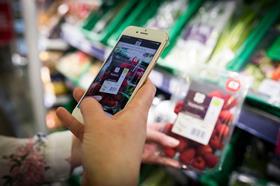
Shoppers in the UK and Ireland are slower to adopt new e-commerce technologies than their global counterparts, despite an increasing demand for greater convenience, according to new research.
Data from Nielsen shows that FMCG online sales now account for almost seven per cent of total FMCG sales in the UK. By the end of 2020, the market researcher anticipates that online FMCG sales through supermarkets will be close to £10 billion a year, up from £7bn in 2017.
Alongside this growth in online FMCG sales is the rising global demand for greater e-commerce convenience. The NielsenQuest for Conveniencereport highlights rapidly growing demand for convenience in markets around the world, including the UK and Ireland, with more than a quarter of global consumers seeking out products that make their lives easier (27 per cent) and are convenient to use (26 per cent).
Despite using self-service checkouts more than shoppers in other global markets, consumers in the UK and Ireland failed to show significant interest in using other e-commerce technologies, such as in-store wifi, QR codes, mobile shopping lists, and social media to aid purchasing decisions.
Mike Watkins, head of retail insight at Nielsen, said there was a 'clear need for more to be done in terms of educating and encouraging the use of new and emerging e-commerce technologies that will deliver the convenience that consumers demand”.
He added: “Over the last four years, Nielsen has been tracking a rapidly growing demand for convenience in markets around the world and identified the factors driving this, which include shrinking household sizes, generational needs, and emerging technology.
'These drivers of convenience, and increasing demand for products and solutions which help to simplify lifestyles, are having an impact across a myriad of industries, particularly e-commerce.'
Some 32 per cent of UK shoppers, and 31 per cent of shoppers in Ireland said they use self-service checkouts to reduce checkout times, compared with a global average of just 23 per cent. But when it came to willingness to log in to a store's wifi, only 20 per cent and 29 per cent, respectively, said they would do so to receive more information or offers in store.
This is significantly lower than an average of 36 per cent globally, and 40 per cent in Asia Pacific. According to Nielsen’s data, the region stands out as a world leader for e-commerce technology adoption.
Similar results were found for the use of QR codes, with only 18 per cent of UK shoppers, and 25 per cent in Ireland, saying they would be willing to scan codes to access more detailed product information in store. This compares with a global average of 34 per cent and 39 per cent average in Asia Pacific.
Willingness to use online or mobile shopping lists in the UK (21 per cent) was also considerably lower than the global avergae (36 per cent), and the use of social media to aid purchasing decisions was only favoured by nine per cent of UK shoppers, compared to 30 per cent in Asia Pacific.



